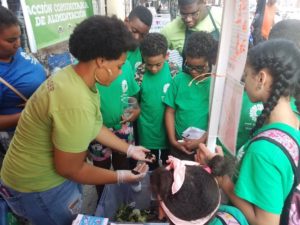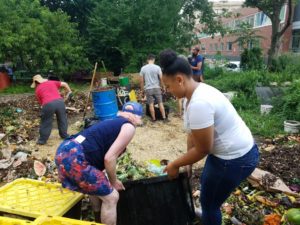By Maria Caicedo, Cooking and Gardening Coordinator
This year at the 170 Farm Stand, we became an official Grow NYC food scraps drop-off site. Excited for the possibilities to encourage community members to give us their banana peels, broccoli stems, eggshells, and anything that was once alive (plant-based), we thought it best to showcase a worm bin during market days, and asked shoppers to observe vermicomposting taking place live! If people could witness what it meant for scraps to break down, we would at least succeed in awakening curiosity and interest in the topic of composting. But what is compost and why should we care about the soil?

Community composting initiatives around the country and in New York City are making strides in rallying community members’ support. There are a number of reasons to compost but at the very foundation of this work is the premise that “without healthy soil, we can’t have healthy water, or healthy air”; both essential elements to our survival. Composting is basically mother nature’s way of recycling. There is no garbage pick-up in the forest, right? So, all organic material breaks down on the forest floor, goes back into the soil, and in the process feeds the earth with rich minerals and nutrients. The result: healthy soil; which allows all living creatures to continue to thrive, live and eat off of it. Whether we live in the country or in the city, healthy soil should be everyone’s concern because without it, there’s no life.
Another reason to compost is to avoid sending organic waste into landfills. Landfill gases are produced when bacteria break down organic waste, and are a mixture of about half methane and half carbon dioxide; both of which adversely affect the atmospheric layer. In the words of Braeden Cohen from the NYC Compost Project at the NY Botanical Garden in the Bronx, “we have a massive waste issue”. The United States is the #1 trash-producing country in the world. According to the Solid Waste and Landfill Facts from the University of Southern Indiana, “every year, each American throws about 1,200 pounds of organic garbage that can be composted”. We have to shift our thinking to “feeding people, and not landfills”.

Meanwhile, our food scraps bin collection dwindled in the ounces. But we are not discouraged. Through composting, we can contribute to something that is bigger than us. In doing so, we can solve a number of other issues along the way, and be more proactive participants in the food system that we aim to change. This was just a battle. The war is ongoing.